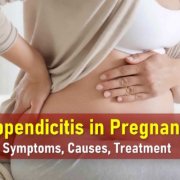Common Discomforts During Pregnancy and How to Find Relief
Pregnancy is an exciting and transformative time, but it can also bring a range of physical discomforts. While some women sail through pregnancy with minimal issues, others face various challenges. These discomforts, though often temporary, can make the journey more difficult. Understanding these common issues can help expectant mothers better prepare and manage the symptoms. Below, we will explore some of the most frequently reported discomforts during pregnancy and offer practical tips to alleviate them.
Morning Sickness and Pregnancy Nausea
Morning sickness is a well-known symptom of early pregnancy, affecting up to 70-80% of pregnant women. Despite the name, morning sickness can occur at any time of the day and may last beyond the first trimester for some women. The primary cause is thought to be hormonal changes, particularly the increase in pregnancy hormones such as human chorionic gonadotropin (hCG). While nausea and vomiting are common, they can become debilitating for some women.
The discomfort often worsens with stress, travel, and certain foods, such as spicy or fatty dishes. To ease the symptoms, try eating smaller, more frequent meals. A diet rich in protein and complex carbohydrates, such as whole grains and leafy greens, can help reduce nausea. Ginger, available in tea or candy form, may also provide relief for some women.
In more severe cases, nausea and vomiting can lead to dehydration and weight loss. This condition, called hyperemesis gravidarum, requires medical treatment and possibly intravenous fluids. If you experience persistent or severe nausea, contact your healthcare provider.
Abdominal Pain and Cramping During Pregnancy
Lower abdominal pain during pregnancy is quite common and can occur for several reasons. In the early stages, cramping is often caused by the uterus stretching as it grows to accommodate the developing baby. This discomfort, known as round ligament pain, can be sharp or dull and is usually temporary.
Cramping during pregnancy can also be a sign of early pregnancy symptoms, especially in the first trimester when your body is adjusting. If the cramping is severe or persistent, or accompanied by bleeding, it’s important to consult a healthcare provider to rule out more serious conditions, such as an ectopic pregnancy.
As the pregnancy progresses, mild cramping can also occur as the body prepares for labor. Changing positions, resting, or using a heating pad may help alleviate these pains. Always speak to your doctor if the discomfort becomes more intense or doesn’t go away after a few hours.
Constipation and Digestive Issues
Constipation during pregnancy is a common complaint, particularly as the pregnancy advances. The hormone progesterone, which is elevated during pregnancy, can slow down the digestive system, leading to slower movement of food through the intestines. Additionally, the growing uterus puts pressure on the rectum, further complicating the process of digestion.
To alleviate constipation, pregnant women are encouraged to increase fiber intake by eating more fruits, vegetables, whole grains, and beans. Staying hydrated and engaging in regular physical activity, such as walking, can also help keep the digestive system moving. Avoiding excessive iron supplements, which can exacerbate constipation, may be beneficial as well. If constipation persists or becomes uncomfortable, discuss safe over-the-counter remedies with your healthcare provider.
Heartburn and indigestion are also common during pregnancy, often caused by the growing uterus putting pressure on the stomach. This can force stomach acid up into the esophagus, causing discomfort. Eating smaller meals throughout the day and avoiding lying down after eating can help minimize heartburn.
Headaches and Pregnancy Hormones
Headaches during pregnancy are another common discomfort, often caused by hormonal fluctuations, particularly in the first trimester. For some women, headaches may occur due to stress, dehydration, or even eye strain from the changes in the body’s physiology. While they are generally not a cause for concern, persistent or severe headaches should not be ignored.
Staying hydrated, avoiding headache triggers like loud noises or certain foods, and maintaining a healthy sleep schedule may help reduce the frequency of headaches. If headaches are severe or accompanied by other symptoms like vision changes or nausea, it could be a sign of preeclampsia, a pregnancy complication that requires medical attention.
Back Pain and Pelvic Discomfort
Back pain during pregnancy is a common complaint, especially as the body adapts to the growing baby. The increased weight and shift in posture can strain the lower back and pelvis, leading to discomfort. Pelvic pain can also result from the loosening of the pelvic joints in preparation for labor.
To alleviate back pain, practice good posture and avoid standing for long periods. Wearing shoes with proper support can also help. If you experience sciatica, a condition where pressure on the sciatic nerve causes pain that radiates down the back of the leg, applying heat or cold to the affected area may provide relief. Consult your healthcare provider for exercises that strengthen your back muscles and promote better posture.
Pregnancy Acne and Skin Changes
Pregnancy can cause various changes to your skin due to fluctuating hormone levels. Acne is a common issue for many women, particularly those who have struggled with it in the past. The increase in oil production and changes in skin texture often lead to breakouts. If you have never had acne before, pregnancy may trigger it for the first time.
To manage acne during pregnancy, wash your face twice daily with a mild cleanser and lukewarm water. Use oil-free makeup products and avoid picking or squeezing acne, as this can lead to scarring. If acne persists, consult your healthcare provider before using over-the-counter acne treatments. Some medications, like oral retinoids, can be harmful to your baby, so always check with your provider first.
Other skin changes may include the darkening of the areola, increased pigmentation on the face (known as the “mask of pregnancy”), and the appearance of stretch marks on the abdomen, breasts, and thighs. These changes are usually temporary and fade after delivery, but using sunscreen and moisturizing the skin may help prevent further pigmentation issues.
Fatigue and Pregnancy Insomnia
Fatigue is one of the most common complaints during pregnancy, especially in the first and third trimesters. As your body works harder to support the growing baby, you may find yourself feeling more tired than usual. Pregnancy insomnia, or difficulty sleeping, is also common due to physical discomforts, hormonal changes, and frequent trips to the bathroom.
To combat fatigue, make sure you’re getting enough rest. Aim to sleep on your left side with a pillow between your knees to improve circulation and relieve pressure on your back. If insomnia is an issue, establish a relaxing bedtime routine and avoid caffeine in the afternoon. Short naps during the day can also help boost energy levels.
Varicose Veins and Swelling
Varicose veins and swelling in the legs, ankles, and feet are common in pregnancy due to increased blood volume and the pressure exerted by the growing uterus. Varicose veins can cause discomfort and may appear as swollen, purple veins, particularly in the legs and pelvic area.
To reduce swelling, avoid standing for long periods and elevate your feet whenever possible. Wearing compression stockings can also help improve circulation. If you notice sudden or severe swelling, especially in the hands or face, consult your healthcare provider, as it could be a sign of preeclampsia, a serious pregnancy complication.
Hemorrhoids
Hemorrhoids are a common discomfort during pregnancy, caused by increased blood flow and the added pressure in the pelvic area. As the uterus grows, it puts pressure on veins in the lower part of the body, which can lead to swollen blood vessels around the rectum. Hemorrhoids can be itchy, painful, and even bleed.
To alleviate symptoms, it’s important to avoid constipation by eating a high-fiber diet, drinking plenty of fluids, and staying active. Warm baths, particularly those with Epsom salts, can provide relief and help reduce swelling. If the symptoms are severe or persistent, consult your healthcare provider for further advice or treatments.
Shortness of Breath
As pregnancy progresses, many women experience shortness of breath. This is due to the growing uterus, which pushes against the diaphragm and reduces lung capacity. You may feel winded even when performing simple activities. While this is generally normal, it can be uncomfortable.
To manage shortness of breath, practice deep breathing exercises to improve oxygen intake and reduce anxiety. Taking breaks during physical activity, avoiding strenuous exercise, and staying hydrated are also helpful strategies. If shortness of breath becomes severe or is accompanied by chest pain, dizziness, or swelling in the legs, seek medical attention immediately as it could be a sign of a more serious condition.
Pregnancy Brain
Many women experience “pregnancy brain,” a term used to describe forgetfulness, mental fog, and difficulty concentrating during pregnancy. This condition is largely attributed to hormonal changes and the mental and physical demands of pregnancy. Pregnancy brain can make it harder to focus, remember things, or even complete tasks you would typically manage with ease.
While this is a temporary issue, it can be frustrating. To cope, stay organized by making lists, setting reminders, and allowing yourself extra time for tasks. It’s also essential to prioritize rest, as fatigue can exacerbate memory problems. If the symptoms feel overwhelming, don’t hesitate to discuss them with your healthcare provider, who can offer advice on how to manage this common pregnancy discomfort.
Conclusion
While pregnancy brings many challenges, most discomforts are temporary and can be managed with lifestyle changes and by working closely with a healthcare provider. Maintaining a healthy diet, staying active, and practicing self-care can go a long way in alleviating these common symptoms. However, always consult your doctor if you experience severe or persistent symptoms to ensure the health of both you and your baby.
Frequently Asked Questions (FAQs)
What causes nausea and vomiting during pregnancy?
Nausea and vomiting during pregnancy, commonly known as morning sickness, are primarily caused by hormonal changes, especially the increase in human chorionic gonadotropin (hCG). While most women experience nausea in the first trimester, some may continue to feel unwell throughout their pregnancy.
How can I relieve back pain during pregnancy?
To relieve back pain, practice good posture, wear supportive shoes, and avoid standing for long periods. Sleeping on your left side with a pillow under your belly and between your legs can also reduce pressure on your back. Gentle exercises, like pelvic tilts, can help strengthen back muscles.
Why do I experience acne during pregnancy?
Pregnancy hormones can cause the skin to produce more oil, leading to clogged pores and acne. Hormonal fluctuations during pregnancy increase oil production in the skin, which can result in breakouts. To manage acne, wash your face gently with a mild cleanser and avoid using harsh treatments without consulting your healthcare provider.
What are the signs of gestational diabetes during pregnancy?
Common symptoms of gestational diabetes include excessive thirst, frequent urination, fatigue, and blurred vision. However, many women do not experience noticeable symptoms. A healthcare provider will test for gestational diabetes as part of routine prenatal care to ensure proper management of blood sugar levels.
Is it normal to experience leg cramps during pregnancy?
Yes, leg cramps are common during pregnancy, especially in the second and third trimesters. They can be caused by changes in circulation, pressure from the growing uterus, or a lack of certain nutrients like magnesium. Stretching, staying hydrated, and wearing supportive footwear may help prevent cramps.
What can I do to manage heartburn during pregnancy?
To reduce heartburn, eat smaller meals throughout the day and avoid lying down after eating. Steer clear of spicy, greasy, or acidic foods that can trigger heartburn. Drinking water between meals and raising the head of your bed while sleeping can also help alleviate symptoms.
Why am I so tired during pregnancy?
Fatigue is common during pregnancy due to the increased energy demands of your body as it supports the growing baby. Hormonal changes, changes in blood volume, and physical discomforts like insomnia or frequent bathroom trips can contribute to tiredness. Rest, balanced nutrition, and light exercise may help manage fatigue.
How can I relieve pregnancy-related headaches?
Pregnancy headaches are often caused by hormonal changes or stress. Stay hydrated, get plenty of rest, and try relaxation techniques to reduce stress. If headaches become severe or are accompanied by other symptoms like blurred vision or high blood pressure, contact your healthcare provider immediately.










